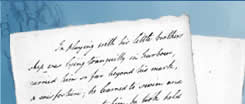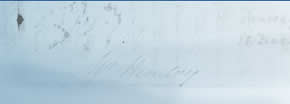Address:
Capt Matthew Flinders
Mary Street
Fitzroy Square
Annotation: Dec. 8. 1812
Mr H
India House 7th Decr 1812
My Dear Sir
Permit me the indulgence of presenting you with a Copy
of the Sailing Directions & Charts, hitherto published by me; – should
they ever be of the smallest use to you, I shall feel highly gratified,
although your Great Work, will perhaps have no affinity with those
parts to which my labours have been chiefly confined.
Allow me to mention to you, a subject which I have frequently revolved
in my mind, since the unfortunate loƒs of H.M.Ships St. George, Defence, and
particularly the Hero, when returning from the Baltic at the commencement of last
winter; – and the Victory I have been told, was nearly sharing the same fate.
The loƒs of the Hero was certainly ^ occasioned by steering a Course too much Southerly, from
an apprehension of getting near Smiths Knowl and the other Shoals toward the
English Coast, for in order to avoid these, she made the Signal in the evening before
she was lost, to steer SW, which carried her on the Shoals off the Texel, whilst
some of the Veƒsels under her Convoy would not follow on a SW Course, but hauled
up WSW and reached the English Coast in safety. – The Masters of these Veƒsels
seem to have been aware of an allowance to be made for an Easterly Current, which
the strong N.W. winds generally force into the great bight formed between Jutland
and the Texel, particularly in the winter months.- This I have myself experienced
in my younger days, when employed in the Trade to Hamburgh; but many of the
Pilots of H.M.Ships for the North Sea, appear to make no allowance for this
Easterly Current. – Neither is it long since two Frigates were wrecked in Dunbar
Bay, by an error in their Reckoning, and mistaking a burning lime kiln for the light
of the Isle of May. –
In narrow Seas, such as the North Sea, misfortunes are no doubt liable to
happen during the long nights of winter, but I have often thought they would seldom
occur, were some plan of the following nature put in practice on board of H.M.
Ships. – I believe few Ships at present have Teachers of Navigation and
Astronomical Science, appropriated to them, and those who are employed as Teachers,
I fear, are men destitute of the principles of honor, for a few days ago I saw in a
Newspaper, that a Schoolmaster had been sent before the Mast for inebriety.
Were Frigates and all higher Rates, to have Teachers of respectability, and well
qualified to instruct the young Officers in Nautical Astronomy, both in theory & practice,
it would probably add much to the safety of H.M.Ships, but such Teachers ought to be
adequately rewarded, and placed beyond the chance of indigence.
Probably you have experienced as I have done, that in most situations, when
the Sun is obscured in the day, there are intervals of clear weather in the night
when observations of Stars may be taken, and as Stars are passing the meridian
hourly & half hourly throughout the night, would it not be advantageous to station some
of the young Officers who are most attentive, to observe the Latitude by the Stars as they
pass the meridian, taking also sights for the Chronometer of those Stars both East & West of
the meridian, which have a quick motion? By adopting a plan of this nature, it
would seldom happen that the situation of a Ship would not be ascertained once or
twice every night, within a few miles of the truth, which certainly is of great importance
in narrow seas during long winter nights, when even in the day at this season, frequently
observations cannot be obtained. – The sights might be taken at first, and the altitudes
computed, by expert Officers, or by the Teacher; but if a practical system of this kind
were encouraged generally, the young Officers (at least many of them) would soon become
proficients, and might be trusted to, particularly as error would become conspicuous, if
the Observations taken by different Officers were kept separate, and compared with each
other.



